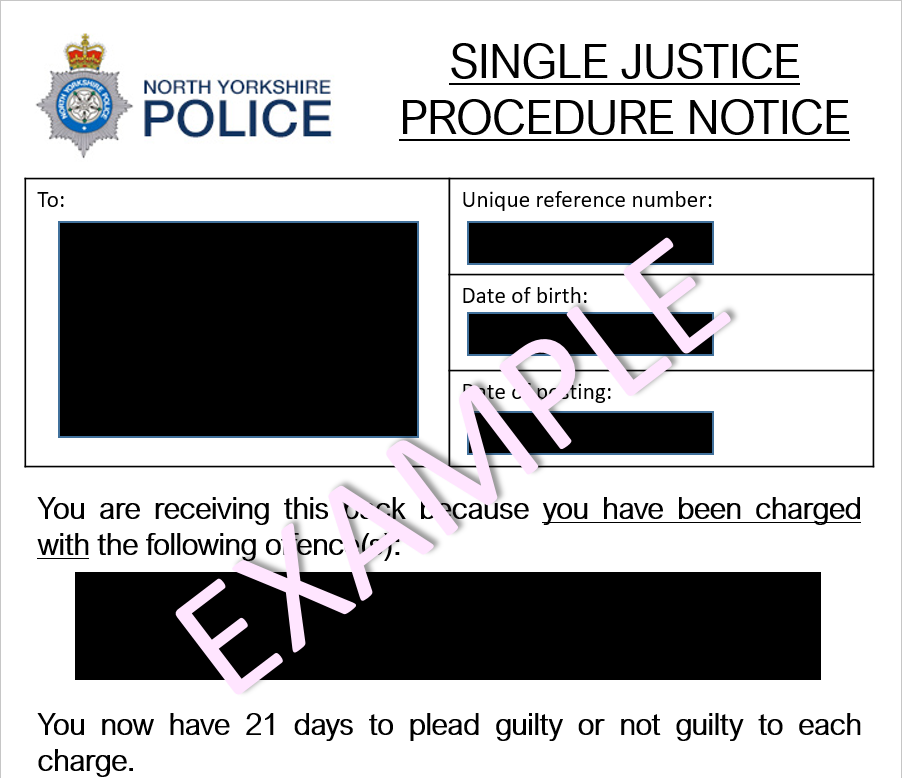Single Justice Procedure Notice
The Criminal and Justice Act 2015 introduced Single Justice Procedure Notices as an expedited way to bring charges against defendants.

A Single Justice Procedure Notice ("SJPN") can only be used in the Magistrates Court, as such, the summary time limit applies. If the charge is laid then the Court may produce a SJPN which allows for the case to be decided without a hearing.
Time-Limits
The first matter to be aware of is that the charge must still be laid within 6 months of the offence date. As a result, except in certain circumstances, proceedings will be time-barred if they are commenced outside of the time limit.
It is vitally important to complete a SJPN within the time limit stipulated, this will be 21 days. If you do not complete the SJPN the Court will proceed in absence and in almost all circumstances convict the Defendant without a hearing. This can lead to a disqualification and/or a substantial fine being imposed.
The Process
Once the Form has been completed, a single Magistrate will consider the contents with a legal advisor and make directions. If there is a guilty plea then the matter can proceed to sentence, if there is no plea then it can be proved in absence.
If a Not Guilty plea is entered by post, the Court will either fix the case for a case management hearing or fix a trial date.
Pleading Guilty
If you are intending to plead guilty to the offence, then the form is still very important as the contents will be used to determine the sentence. This will include the imposition of a victim surcharge and an order to pay the costs of a prosecution.
The financial means section must be completed honestly and accurately. However, there are certain approaches that should be taken to ensure that the fair and proportionate financial penalty is imposed.
It is also appropriate to include mitigation within any guilty plea. This can include character references and information about the offence. In many circumstances, it is possible to serve a sentencing note alongside the SJPN which sets out the approach the Court can take. Rhys is regularly instructed to advise on the completion of SJPN forms and given there is no need for a hearing, costs can be low - often, it can mean that the decrease in financial penalty is greater than the fee.
If you are sentenced in absence, you can appeal your case to the Crown Court and have a full hearing.
Pleading Not Guilty
If you plead Not Guilty, it is right to ensure that the case is properly case managed. It is also possible to take this as an opportunity to draft representations which can lead to the case not being pursued, this happens regularly and Rhys' recent case news shows various examples of this.
The Court will then make various directions, including about the service of prosecution evidence. The CPS will need to be serve witness statements and the exhibits that they rely on. They will also need to serve unused material.
It can be very helpful to get legal advice at this stage, it will mean that a Preparation for Effective Trial form can be completed and the case is started on the front-foot. If the CPS fail to comply with the directions or to disclose material it will often mean that the case is brought to an end.
Can I request a hearing?
It remains an option to request a Court Hearing. This can be useful if there are particular circumstances in the case which mean it needs to be dealt with particularly carefully.
What if I've missed the SJPN deadline or I didn't know about the pack?
If you have been convicted in absence or when you were unaware of the proceedings, you can make a statutory declaration, apply to re-open proceedings or to appeal the case to the Crown Court
Fill in the Below to Contact Rhys and to obtain legal advice










